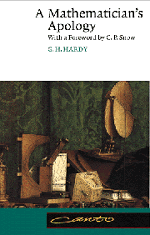Summary
THERE is another remark which suggests itself here and which physicists may find paradoxical, though the paradox will probably seem a good deal less than it did eighteen years ago. I will express it in much the same words which I used in 1922 in an address to Section A of the British Association. My audience then was composed almost entirely of physicists, and I may have spoken a little provocatively on that account; but I would still stand by the substance of what I said.
I began by saying that there is probably less difference between the positions of a mathematician and of a physicist than is generally supposed, and that the most important seems to me to be this, that the mathematician is in much more direct contact with reality. This may seem a paradox, since it is the physicist who deals with the subject-matter usually described as ‘real’; but a very little reflection is enough to show that the physicist's reality, whatever it may be, has few or none of the attributes which common sense ascribes instinctively to reality. A chair may be a collection of whirling electrons, or an idea in the mind of God: each of these accounts of it may have its merits, but neither conforms at all closely to the suggestions of common sense.
I went on to say that neither physicists nor philosophers have ever given any convincing account of what ‘physical reality’ is, or of how the physicist passes, from the confused mass of fact or sensation with which he starts, to the construction of the objects which he calls ‘real’.
- Type
- Chapter
- Information
- A Mathematician's Apology , pp. 128 - 130Publisher: Cambridge University PressPrint publication year: 1992

